 1-800-805-5783
1-800-805-5783 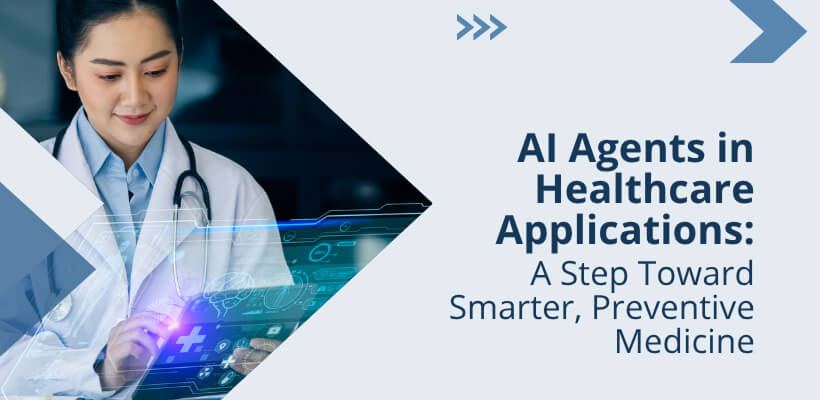
The healthcare industry stands at the cusp of a revolutionary transformation, driven by the emergence of AI agents in healthcare that are fundamentally changing how we approach patient care and medical decision-making.
With the global agentic AI in healthcare market projected to grow from $538.51 million in 2024 to an impressive $4.96 billion by 2030, these intelligent systems are no longer just a futuristic concept but a present reality reshaping the medical landscape. AI agents in healthcare represent autonomous digital assistants that can perform complex tasks, analyze vast datasets, and make intelligent decisions to support clinicians and improve patient outcomes.
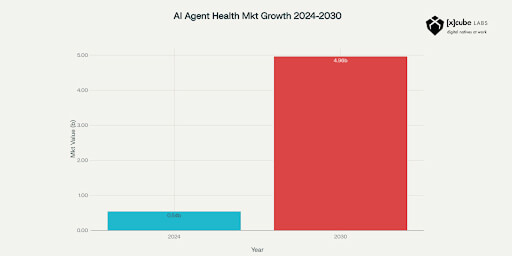
Traditional healthcare has long operated on a reactive model, treating diseases after they manifest and symptoms become apparent. However, AI agents in healthcare are spearheading a paradigm shift toward preventive medicine, enabling early detection, continuous monitoring, and proactive interventions that can prevent serious health complications before they occur. This transition from “Earlier Medicine” to preventive care leverages AI modeling and big data to predict health trajectories and enable timely medical interventions.
The integration of artificial intelligence into preventive healthcare represents more than just technological advancement; it signifies a fundamental reimagining of how healthcare is delivered. By analyzing comprehensive patient data including medical histories, genetic profiles, lifestyle factors, and real-time physiological metrics, AI agents in healthcare applications can identify patterns and correlations that human clinicians might miss, leading to more accurate risk assessments and personalized prevention strategies.
AI agents in healthcare have demonstrated remarkable capabilities in diagnostic accuracy, often surpassing traditional methods. Medical imaging represents one of the most widely deployed clinical AI use cases, with 90% of organizations reporting at least partial deployment. AI-powered diagnostic tools can analyze X-rays, MRIs, CT scans, and other medical images with unprecedented precision, detecting subtle abnormalities that might escape human observation.
For instance, AI algorithms trained to analyze mammograms have shown higher accuracy rates in detecting breast cancer compared to conventional methods. In cancer detection specifically, AI systems can identify early-stage tumors and predict disease progression, enabling interventions when treatments are most effective.
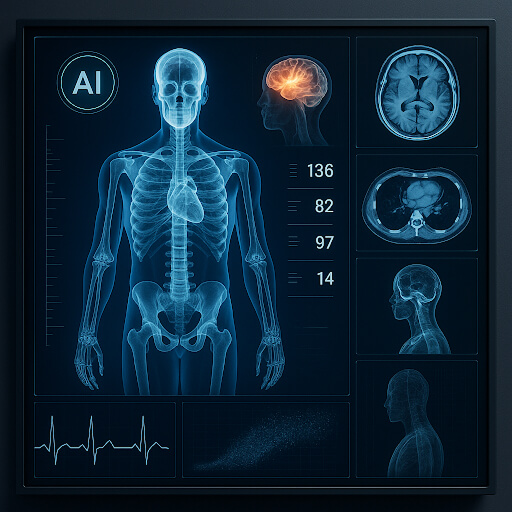
AI-powered medical imaging system analyzing patient diagnostic data
The proliferation of IoT-enabled medical devices and wearable technology has created new opportunities for AI agents in healthcare to provide continuous patient monitoring and care. These systems analyze real-time data from smartwatches, biosensors, and other connected devices to detect health anomalies and alert healthcare providers to potential emergencies.
Remote patient monitoring users in the United States are expected to surpass 71 million by 2025, as 5G networks reduce transmission latency and improve data reliability. AI agents can predict medical emergencies, such as heart attacks or strokes, by continuously monitoring vital signs and triggering interventions when necessary.
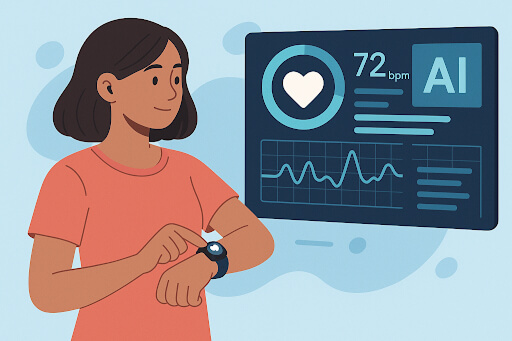
Smart wearables and AI analytics displaying real-time health monitoring data
Beyond clinical applications, AI agents in healthcare are revolutionizing administrative processes by automating repetitive tasks such as appointment scheduling, claims processing, and medical coding. These systems can reduce administrative burdens on healthcare staff, allowing them to focus on patient-centered care activities.
Notable examples include top AI agents in healthcare customer service such as Sully.ai, which specializes in general-purpose healthcare automation, including medical coding and office administration, and Amelia AI, which focuses on patient support by scheduling appointments and providing emotional support. These implementations have achieved remarkable results, with some organizations reporting a reduction of over 90% in patient check-in times.
Examples of AI agents in healthcare are already demonstrating significant impact across various healthcare settings. North Kansas City Hospital achieved over 90% reduction in patient check-in time after implementing Notable Health’s AI automation, reducing the process from 4 minutes to just 10 seconds while increasing pre-registration rates from 40% to 80%.
Aveanna Healthcare uses Amelia AI agents to manage over 560 daily employee conversations, with 95% of employee requests resolved through automated chat systems. Meanwhile, Virgin Pulse maintains a 40% containment rate with Cognigy’s AI agents, which handle customer inquiries without requiring human intervention.
In clinical settings, AI-powered tools like Viz.ai have achieved remarkable outcomes in cardiovascular care, saving 87 minutes in time to treatment, reducing hospital stays by 3.5 days, and achieving a 23% reduction in stroke-related disability.
What are some real-world applications of AI agents in healthcare in preventive medicine? The applications span multiple domains, from predictive analytics that identify at-risk patients to personalized health recommendations based on genetic and lifestyle factors. AI systems can analyze comprehensive datasets from electronic health records, genomic sequencing, and environmental influences to generate predictive risk scores that alert both patients and physicians to potential health concerns.
The development of medical digital twins, virtual replicas of individual biological processes, represents a cornerstone of preemptive medicine. These systems enable the precise simulation of human physiological profiles, the prediction of future health outcomes, and virtual clinical trials, facilitating personalized, proactive interventions.
The economic impact of AI agents in healthcare is substantial and continues to grow rapidly. The broader AI in healthcare market is valued at $29.01 billion in 2024 and projected to reach $504.17 billion by 2032, exhibiting a CAGR of 44.0%. Healthcare organizations are investing an average of $39.7 million over the next five years in AI-related projects, reflecting the industry’s confidence in these technologies.
Current adoption rates are encouraging, with 86% of healthcare organizations already extensively utilizing AI, and 62% of respondents reporting that they have implemented an AI strategy. The expectation for return on investment has also improved, with 50% of organizations expecting to see tangible cost savings within three years or less.
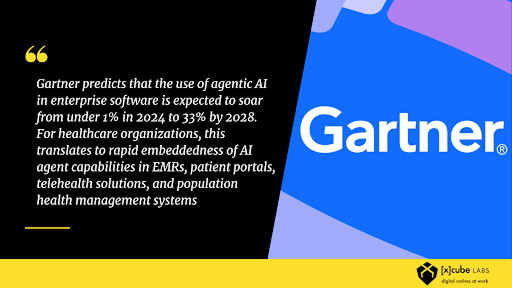
Despite the promising potential, AI agents in healthcare face several implementation challenges. A recent survey identified immature AI tools as the most significant barrier, cited by 77% of respondents, followed by financial concerns (47%) and regulatory uncertainty (40%). Additionally, healthcare organizations must address integration challenges with legacy systems, data privacy concerns, and the need for staff training.
To successfully implement AI agents, healthcare providers should assess their organizational needs, select scalable and interoperable solutions, build cross-functional implementation teams, and ensure compliance with healthcare regulations, such as HIPAA. The gradual introduction of AI agents, starting with administrative tasks and then expanding to clinical applications, helps build trust while maintaining high care quality.
Looking ahead, AI agents in healthcare will become increasingly sophisticated and autonomous. The integration of AI with cloud computing, wearable devices, and telehealth platforms will enable hyper-personalized care, real-time monitoring, and AI-powered decision-making support. Advanced capabilities, such as agentic AI systems that can autonomously handle multi-step tasks, will become commonplace. These systems can autonomously verify patient identities, update medical records, and schedule follow-up appointments.
The convergence of AI agents with emerging technologies, such as 5G connectivity, blockchain for data security, and augmented reality for surgical applications, will create new possibilities for healthcare delivery. These technologies will enable remote surgery, real-time patient monitoring with minimal latency, and secure, transparent data management for healthcare.
As AI agents in healthcare become more prevalent, establishing trust through responsible implementation remains crucial. Healthcare leaders emphasize that the introduction of AI should be measured and gradual, particularly in patient-facing roles. The focus should be on augmenting human capabilities rather than replacing healthcare professionals, ensuring that AI agents serve as powerful tools to enhance clinical decision-making and patient care.
The successful integration of AI agents requires addressing ethical implications, ensuring algorithmic transparency, and maintaining human oversight in critical medical decisions. Healthcare organizations must also invest in digital literacy programs for staff and patients to maximize the benefits of these technologies while minimizing potential risks.
AI agents in healthcare represent a transformative force that is reshaping the medical industry from reactive treatment to proactive prevention. With their ability to analyze complex datasets, automate routine tasks, and provide intelligent insights, these systems are enhancing diagnostic accuracy, improving patient outcomes, and optimizing healthcare operations.
As the market continues to expand rapidly, healthcare organizations that strategically embrace these technologies will be positioned to deliver more efficient, personalized, and accessible care to patients worldwide. The future of healthcare is not just about treating illness; it’s about preventing it through intelligent, data-driven insights that keep people healthier for longer.
1. What are AI agents in healthcare?
AI agents in healthcare are advanced software systems designed to autonomously perform tasks such as data analysis, patient monitoring, and clinical decision support. They utilize artificial intelligence to analyze large volumes of medical data, enabling healthcare professionals to deliver smarter, more timely care.
2. How do AI agents in healthcare support preventive medicine?
AI agents in healthcare enable preventive medicine by predicting health risks, identifying early signs of disease, and recommending personalized interventions tailored to individual needs. By continuously monitoring patient data, these agents can alert clinicians and patients to potential health issues before they become serious.
3. What are some real-world applications of AI agents in healthcare?
AI agents in healthcare applications include diagnostic imaging interpretation, remote patient monitoring, administrative task automation, and enhancing customer service experiences. Examples of AI agents in healthcare range from chatbots managing appointment scheduling to advanced algorithms that detect diseases from medical scans.
4. Who are the top AI agents in healthcare customer service today?
Some of the top AI agents in healthcare customer service include solutions that automate appointment scheduling, process billing inquiries, assist with patient intake, and provide support for common questions. These AI systems help healthcare organizations boost efficiency and improve patient satisfaction.
5. How can healthcare organizations successfully implement AI agents?
To successfully deploy AI agents in healthcare, organizations should assess their actual operational needs, invest in staff training, select scalable and secure platforms, and ensure compliance with healthcare regulations. Starting with non-clinical tasks, such as administration, can pave the way for broader and more impactful adoption of AI technology.
At [x]cube LABS, we craft intelligent AI agents that seamlessly integrate with your systems, enhancing efficiency and innovation:
Integrate our Agentic AI solutions to automate tasks, derive actionable insights, and deliver superior customer experiences effortlessly within your existing workflows.
For more information and to schedule a FREE demo, check out all our ready-to-deploy agents here.